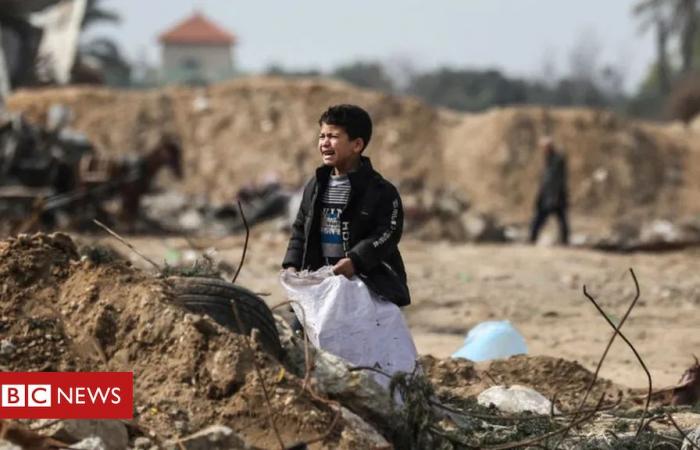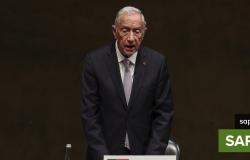A Palestinian boy in Maghazi, central Gaza
- author, Jeremy Bowen
- Roll, From BBC News in Israel
-
18 minutes ago
All but the shortest wars go through moments when killing is an unchanging, grim routine.
There are also periods, like the last few days in the Middle East, when events leave the belligerents and their allies at a crossroads with big decisions that need to be made.
Choices confront government and military leaders in Israel and Tehran, at Hezbollah headquarters in the southern suburbs of Beirut and further afield in the Gulf, in Europe and America.
Israel and Egypt have banned foreign journalists from entering Gaza, except for occasional visits with Israeli military personnel, in highly controlled and brief situations.
Israelis must win the media battle in an era of asymmetric warfare, where victory or defeat may depend on both the perceptions and the realities of the battle. Journalists are often denied access to a war when the parties fighting it have something to hide.
But even without foreign reporters on the ground, evidence is accumulating that Israel is not, as it claims, respecting its obligations under the laws of war to respect civilian lives, or allowing the free flow of aid in a famine created by the Israel’s own actions.
After World Central Kitchen staff were killed in Gaza, President Biden took a more forceful stance in public statements to condemn Israel’s actions.
The president and his advisers must now decide whether words are enough. So far, they have resisted calls to impose conditions on the use of American weapons in Gaza, or even to disconnect the supply line.
While the weapons are still arriving, Israeli Prime Minister Benjamin Netanyahu, who depends on hard-line Jewish ultranationalists to remain in office, may feel he can still afford to defy President Biden.
A major test will be Israel’s planned offensive against Hamas in Rafah, plans that the US believes would worsen the humanitarian catastrophe in Gaza. American interests and Joe Biden’s political prospects in an election year have already been harmed by what is seen in many countries as complicity with Israel.
In another episode this week, Netanyahu returned to work after two days off for hernia surgery, amid large demonstrations demanding his resignation and early elections for a new parliament.
The deep cultural and political fissures between Israelis, which were put aside after October 7th, are open again and are shouted at in the streets. The prime minister is in political trouble, blamed by his opponents for letting Israel’s guard down so much that Hamas found an opportunity to attack.
Protesters want Netanyahu to resign
Millions of Israelis who believe that a just war has been waged against Hamas do not trust Netanyahu.
This disbelief includes the perception that prolonging the war is a way of postponing the moment when he will be held accountable for his mistakes, for failing to bring Israel’s hostages home safely and for alienating vital allies, starting with President Biden. .
Add to this the fact that, after a massive six-month attack, Hamas is still fighting, and its top leader in Gaza, Yahya Sinwar, remains alive.
Another new set of calculations about the next phases of the Middle East crisis arises from the assassination of a top Iranian general in Damascus, widely believed in Israel to be the work of its air force. It was a blow to the intelligence services that ignored or did not act to prevent Hamas attacks six months ago. It was also an escalation in the wider war in the region that will have consequences.
Some of it may happen near where I am writing this, looking across the Sea of Galilee toward the Golan Heights, the large swath of southern Syria that Israel captured in the 1967 Middle East war and later annexed.
As the crow flies, Damascus is less than 50 miles away. The border with Lebanon is nearby. Especially at night, there is constant Israeli air activity, with the noise of jets on patrol or bombing raids in Lebanon or Syria.
A parallel war has been raging amid the conflict in Gaza since last October. It all started with Hezbollah, the powerful Lebanese militia and political movement that attacks Israel, in support of Hamas in Gaza. It was not the attack that the Hamas leadership had hoped for – neither Hezbollah nor its patrons in Tehran wanted an all-out war with Israel and, indirectly, with its American allies. The Americans didn’t want that either and curbed Israel’s instinct to respond with full force.
But Hezbollah still arrested thousands of Israeli soldiers and forced the evacuation of around 80,000 civilians from the border areas. Israel’s response, limited compared to previous border wars, forced the displacement of at least as many civilians on the Lebanese side.
Since the beginning of this year it has been different. Israel has set the pace, bombing its enemies deeper into Lebanon and Syria. The biggest leap in the escalation occurred on Monday (1/4) with the assassination by air attack on the Iranian diplomatic complex in the Syrian capital.
Iran accuses Israel of carrying out the airstrike on its consular building in Damascus
In interviews in northern Israel, local officials expressed strong support not just for the assassination but for an invasion of southern Lebanon to destroy Hezbollah and force it to abandon the border.
Hezbollah was not intimidated by Israel’s experience in the last two decades of the 20th century, when it occupied a wide swath of southern Lebanon to try to protect northern Israel. He even created his own Lebanese militia to help with the fighting. The Israelis withdrew in 2000, under constant military harassment from Hezbollah, after Prime Minister Ehud Barak, former head of the army, decided that the occupation of southern Lebanon (Israel called it a “security zone”) did not leave the safer Israelis and it still wasted the lives of their troops.
I walked through the ruins of the Avivim winery, which is right on the border. It was destroyed in a Hezbollah attack last week. Its owner, Shlomi Biton, showed me the wreckage of his business. He is 47 years old and was born in Avivim, which like the rest of northern Israel became a ghost town after the evacuations. Shlomi fought in Lebanon during his military service and now believes that the only way to restore a decent and safe life in the region is through Israel’s return to Lebanon for a decisive battle with Hezbollah.
“There is no other choice,” he told me after his business was destroyed. “Otherwise the community won’t come back to live here, maybe just a few crazy people like me – the kids won’t come back.”
In Kiryat Shmona, a border town where 25,000 Israelis lived, there are no more than 3,000 people left, most of them soldiers and essential workers. Mayor Avichai Stern showed me deserted neighborhoods and destroyed buildings. He believes Israel can eliminate the Hezbollah threat to the north with a decisive and destructive invasion along the lines of the Gaza war.
Kyriat Shmona Mayor Avichai Stern shows fragments of shrapnel from a Hezbollah attack on residential buildings in the city
Mayor Stern said that last year 10,000 Hezbollah fighters took part in the seizure of northern Israel.
“It could happen here,” he told me, “just as it could in Gaza. They weren’t training to direct traffic in Beirut. The only way to stop it is to go to Lebanon and eliminate this threat as quickly as possible.”
Exactly six months ago, in complete secrecy, Hamas was putting the finishing touches on the battle plan it called the flood of Al-Aqsa. The assassination of October 7 and everything that followed destroyed the lazy, hopeful idea that it would be possible to manage the century-long conflict between Arabs and Jews for control of the land between the Jordan River and the Mediterranean Sea.
Hamas pushed the conflict back to the top of the world’s agenda when it killed some 1,200 people, mostly Israeli civilians, and took more than 250 Israelis and foreign citizens to Gaza hostage. Many of the 134 Israelis still at the site are believed to be dead. It was the worst day for Israel since it won the war of independence in 1948.
The “mighty revenge” promised by Netanyahu has already killed more than 32,000 Palestinians, the majority of whom were civilians. US-supplied Israeli firepower destroyed most of Gaza. The war spread throughout the Middle East. Now it may be entering a new phase.
The borders between Israel and Lebanon are deceptively beautiful in the first weeks of spring. Wildflowers and pine cones, not shrapnel, were beneath my feet as I walked along a stretch of border with Israeli military officials.
Any sense of peace was obviously an illusion on one of the most dangerous borders in the Middle East. Iran and Hezbollah are making decisions about how to respond to the killings in Damascus and the way Israel is increasing military pressure in Lebanon. The two allies will want to calibrate their response to avoid a broader and more devastating war that neither wants.
Israel doesn’t want this war either. But the audacious assassination at the Iranian diplomatic compound in Damascus could be a sign that Israel believes Iran and the network it calls the axis of resistance could fall first. If so, it is a risky strategy. Iran could restore its ability to deter Israel, which is clearly not working. It will try to respond in a way that takes Israel by surprise.
Empty, overgrown border communities are unlikely to be Iran’s first choice for retaliation. They might try an Israeli target in another country, or cyber attacks instead of missiles. Or intensify its nuclear program.
An American envoy, Amos Hochstein, is trying to find a way to revive the UN Security Council resolution that ended the last major war between Hezbollah and Israel in 2006. Neither side respected it, but it provided a negotiating framework.
At this crossroads, neither Israel, nor Iran, nor Hezbollah want an all-out war that would have dire consequences for all of them. But neither side appears ready to stop this trend.
Tags: Gaza death humanitarian workers Israeli attack puts conflict crossroads
--





